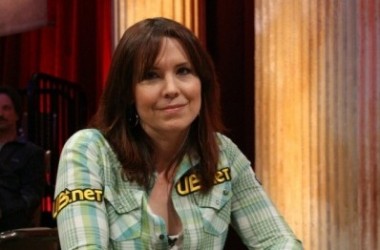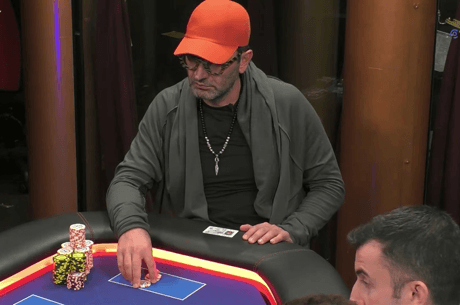Director Aidin Nakhai Talks About Web-Based Game Theory TV

In the poker world, The Micros is to animated comedy what has become to live-action drama. Although only three episodes of Game Theory have been released, they has already drawn critical praise for realism, accuracy and ability to captivate. "I would definitely watch the next few episodes to see what path this drama will take," poker pro Jon Tabatabai said.
Game Theory was the 2008 brainchild of Aidin Nakjai, who, with the help of his friend and filming partner Brad Merkle, recently brought the Web show to life. The two, who met while working for the same documentary film company, and who share a passion for film, also brought in Moricio Carvajal to be the director of photography, and then added a third creative partner Todd Vandale.
Game Theory continues to gain traction in the poker world with each episode — you can watch the pilot at the end of this article and also find links to Episodes No. 2 and No. 3. Nakjai recently sat down with PokerNews for an in-depth interview.
How did the idea for Game Theory come about?
My passion in life is filmmaking. After I studied and earned a degree in film and media production, I worked for a production company directing TV documentaries. Around this time, my passion for the game of poker had become almost as strong a current as my love of film making, so I thought to merge the two and formed a concept about a dramatic series following the life of a poker player.
Two things got me excited about the idea, one — there was nothing else like it. And two — while there was a lot of poker programming, it was all cash-game or tournament coverage, there wasn’t anything that took you into the mind and life of a player as he went through swings and dealt with life issues. I was interested in the situation, the story surrounding the players that play high-stakes cash games for example. Are they staked? Did they sell pieces of themselves? What do they do when they win big, or lose $100,000? It boggles the average person’s mind to see people betting $50,000-$100,000 in one hand. That’s more than most people make in a year. So this is the ultimate arc: to have a player start off small, where he is worried about having cab fare, and work his way up so you can see the transformation and how he gets to that level and manages his bankroll.

How did you go about casting for Game Theory? Are the actors and actresses poker players in real life?
When this show was in development with the production company I was working for, we discussed professionally casting the main actor. I wanted to have a poker table in the casting session to play heads-up with the actor during the auditions. Although I said this lightheartedly, the point was to emphasize that the actor has to know and play poker. Now, anyone can learn chip-handling tricks, but it is imperative for me to have that reference, experience and understanding when in discussion with actors.
Since we are now an independent production, they key to casting without a budget is to have people who are available. Getting everyone together at the same time, when you are relying on favors, it’s problematic. So, I cast people that I know, and for the poker scenes I cast people that I know play poker and have a good amount of experience.
Can you give us a little information on what it takes to produce a single episode? What’s the process like?
After I made the decision that I had to make this show and could not rely on funding as it suffered in 'development hell,' it really becomes a guerrilla-style filmmaking process. With two filmmaking friends and minimal crew, plus relying on favors, we just did what we had to do to make it happen. Producing an episode boils down to availability of cast and crew. Key pieces in both are from different cities so managing time schedules becomes a juggle. The process can be trying, but ultimately I have so much love for filming, and I’m passionate about poker. These two motivators fuel me even in the most pressing situations.
You conceived the idea for Game Theory awhile back and then had to shift gears after Black Friday. Can you talk a little about that?
I went through several variations as I was developing the concept. I thought about making it a period piece, set in the 70s, or 80s, well before the poker boom. Then I settled on making it more current, post-2003. When Black Friday hit, I worried about the negative image of poker in the media and how much more difficult it would be to get something like this off the ground, and sure enough a lot of poker programming was being cut. Finally, we went with making the show more topical in dealing with a specific player’s fallout from Black Friday. Also, the strategic elements and thinking of the game had changed drastically in the last 6 to 8 years, and the more sophisticated and math-based evaluation (some game-theory principles) of hands is interesting and unique to explore in a drama series.
Portraying poker accurately can be difficult, as we’ve seen so many times in big movies. How important is poker accuracy for you?
When I found out they were making Casino Royale for the next James Bond film, I was jazzed because I predicted they would take the original game, Baccarat, from the short story and make it into poker. Unfortunately, the poker scenes succumbed to implausibility and typical mainstream clichés. This is something that is important for me to avoid in striving to be original and realistic. "Poker accuracy" is a somewhat gray term because there can be more than one valid strategy for any given hand. But at the same time, the hands showcased in this series are not meant to be a teaching tool. In fact, the hero will be making mistakes so that he can learn from them later on and improve. I’ve had the most comments about the hand showcased in the pilot being a negative EV play and this was something from the concept stage I had planned. That the opening hand would not be technically correct, that it would be fundamentally unsound. I am looking 18+ episodes down the line where the main character can look back and see his mistakes and have a learning arc.

Given you built this project from the ground up, budgetary issues have always been a concern. Can you tell us a little about that?
Ha — I could tell you a LOT about that. On one hand, I don’t want to sound like I’m making excuses; on the other, I think if some people knew the extreme circumstances behind this project they would be very surprised. The good thing is that we are getting good feedback in terms of visual style and production value. I take it as a compliment when some people think it’s a full-on TV production. The flip side is that being compared to Breaking Bad, House or Dexter — which are actual productions with departments full of people working on them with multimillion dollar budgets — is so extreme given that it’s just me and a couple of film friends and a few hundred bucks. Seriously, that’s what I mean by passion project!
I mentioned some of the problems of having no budget in terms of getting people together relying on favors, lack of time, but I would like to focus on the positive. The hope is that viewers can see the potential of the series, where it can go and how it can get better. If they can see that, then I am happy because I am well aware of the problems we have faced in making this show. I know the weaknesses, but I am also aware of the cause of those weaknesses. If we can get a modest budget for future episodes, I am confident that we will continue to improve.
Do you have aspirations to film at the WSOP or a similar big-venue tournament?
The main character is at the beginning of a very long journey. I have two full seasons written out and detailed plot points after that. He will be playing tournaments, and eventually high-roller events, but it will not be what you expect. You won’t see him at a WSOP final table playing heads up with his dad.
Do you have any plans or desires to feature personalities from the poker industry in Game Theory?
I want to cast Ilari “Zigmund” Sahamies because I think he is a great fit for the tone and style of the first season. As far as other stars, I’m more interested in them playing characters, not cameos as themselves. It is far more interesting if we saw some of these pros we are used to seeing but now in a different, dramatic light like getting smashed at a club or tilting in the pit.
What can viewers expect from Game Theory moving forward? How many episodes are you shooting for and how often do you hope to release them?
It all depends on funding. It is doubtful we will carry on with the way we have been just scraping by. The goal is to use this as a calling card to show people what we can do with limited resources, if people dig it now imagine what we can do with even a modest budget.
Check out pilot episode:
You can also watch Game Theory Episode No. 2 by , and . While you're at it, like and .
Get all the latest PokerNews updates on your social media outlets. on Twitter and find us both and !








